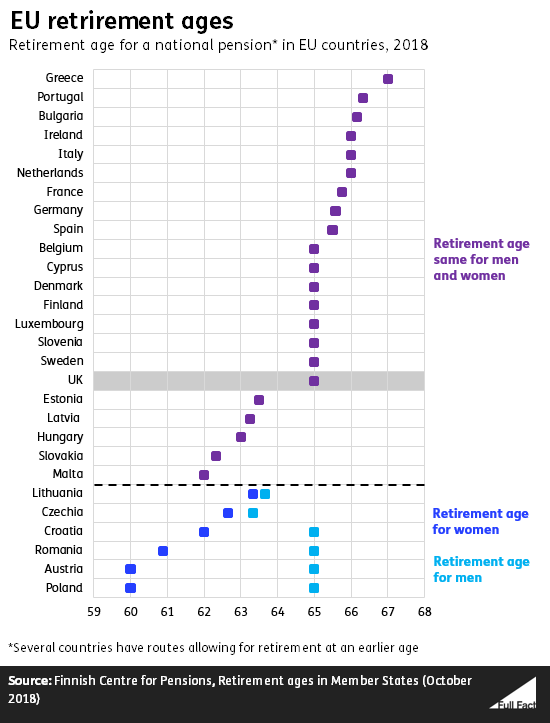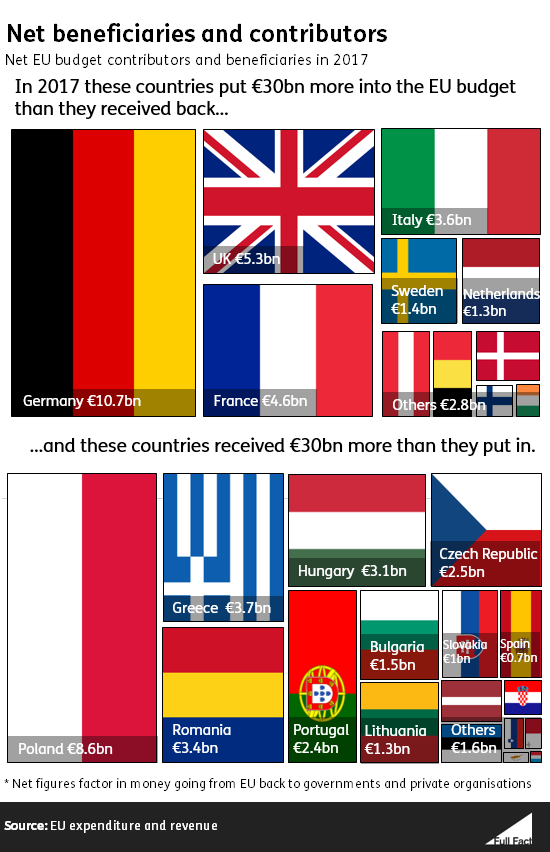What was claimed
People in Poland retire at 60.
Our verdict
The retirement age for women in Poland is 60—the lowest level in the EU. For men it’s 65 (which is the most common retirement age for men and women in EU countries).
People in Poland retire at 60.
The retirement age for women in Poland is 60—the lowest level in the EU. For men it’s 65 (which is the most common retirement age for men and women in EU countries).
The working week in France is 35 hours.
Correct. A full working week in France is officially set at 35 hours. Many employees agree to work more than 35 hours per week—but they will be compensated for this, for example through additional holiday.
The working week in Germany is 28 hours.
This is only for some workers. In 2018, Germany’s largest trade union won a two-year deal for its 900,000 members to work a 28-hour week. German employees can work up to 40 hours a week. If they work longer than this, they must be compensated through additional holiday.
We make one of the biggest contributions to the EU budget.
Correct. The UK contributes roughly the third largest sum of money into the EU budget behind Germany and France, and a similar amount to Italy.
Poland, France and Germany have cheap travel and utilities subsidised by Europe.
Some of the EU budget is invested in transport and energy programmes. But it does not simply subsidise existing services for EU citizens. The UK is also a recipient of this funding.
This Facebook post has been shared over 90,000 times. Some of the individual claims are accurate (including the fact that the UK is one of the biggest contributors to the EU budget), but some are not.
The UK, Germany and France are the three biggest “net contributors” to the EU budget (meaning they all pay in more than they get out), so the UK’s EU budget contributions are not subsidising French and German workers.
Honesty in public debate matters
You can help us take action – and get our regular free email
The retirement age in Poland is 65 for men and 60 for women, following a law which came into effect in October 2017. This reversed a 2013 policy by a previous Polish government which set about gradually raising the retirement age to 67 for both men (by 2020) and women (by 2040).
Poland’s retirement age of 65 for men is shared by 11 other EU countries, including the UK.
The retirement age of 60 for women is the joint-lowest female retirement age in the EU, along with Austria.
Unlike Poland, most other EU countries also plan to raise and equalise the retirement age for men and women in the coming decades.
It’s correct that a full working week is officially set at 35 hours in France.
This doesn’t mean that every French worker religiously clocks off after seven hours each day though. In reality, working practices are quite flexible. Many employees agree in their contracts to work more than 35 hours per week—but they will be compensated for working additional hours, for example through shorter weekly hours at other times, or additional holiday.
EU data shows that, on average, full-time workers in France worked just over 40 hours a week (including overtime) in 2017. The EU average was 41.3 hours and the UK average was 42.6 hours.
Working hours can’t tell us everything either. French workers tend to be more productive than their British counterparts.
In 2018, Germany’s largest trade union won an agreement allowing its 900,000 members the option to work a 28-hour week for up to two years.
Most work longer hours than this though—full-time workers in Germany worked, on average, 41.2 hours per week in 2017 (including overtime).
German employees are allowed to work up to 40 hours during a five-day working week (that doesn’t mean all full-time contracts have to be set at 40 hours a week though). As with France, German employees can agree to work more than this, but must be compensated for it.
In Germany, compensation has to be in the form of additional time off. In addition to extra time off, workers can be paid for overtime—but this is not legally required.
German workers also tend to be more productive per hour than those in the UK.
The UK contributes roughly the third largest sum of money into the EU budget behind Germany and France, and a similar amount to Italy.
If you also take into account money that comes back to the UK from the EU, the UK is the second biggest ‘net contributor’, after Germany and just ahead of France.
Again, because all three countries pay in more than they get out, it’s not accurate to suggest that the UK’s EU budget contributions subsidise Germany or France.
The final part of the post claims the EU budget subsidises utilities and cheap travel.
Part of the EU budget is invested in transport, for the purpose of improving connection in Europe and making transport more climate-friendly, which is part of the EU’s broader goals. The funding is not in place to simply make existing transport networks cheaper.
For example, the UK received €52 million of funding for “transport” as part of the EU’s “smart and inclusive growth” strategy in 2017. Germany received €386 million, France received €248 million, and Poland received €2.2 million.
Some of the EU budget is also spent on utilities, in as much as it invests in energy projects—for example in the form of projects for developing gas pipelines, gas storage and smart grids.
The Institute for Government told us that this is mostly seed funding to kick-start projects and attract private sector funding.
The UK received €14 million of funding for “energy” as part of the EU’s “smart and inclusive growth” strategy in 2017. Germany received €16 million, France received €7 million, and Poland received €1 million.
The European Investment Bank (EIB) also provides loans for these kinds of projects—with the UK as one of the largest recipients.
Since 2014, the EIB has invested €8.8 billion into the UK energy sector, and €4.1 billion into the UK transport sector. This investment is separate to funding from the EU budget.
Full Fact fights for good, reliable information in the media, online, and in politics.
Bad information ruins lives. It promotes hate, damages people’s health, and hurts democracy. You deserve better.